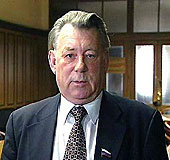A group of lawmakers in Moscow has proposed to reinstate Soviet-era laws that would make consensual sexual relations between two adult men a crime, punishable by one to five years in prison, the BBC reports. Prosecution of homosexual acts was abolished in Russian Federation under the pressure from the Council of Europe in 1993.

Referring to homosexuality, Raykov said: "Is this phenomenon characteristic of our people? No! It's perversion!" He blamed homosexuality as cause for the alarming spread of HIV and AIDS, although HIV/AIDs infections in Russia are primarily spread thorough contaminated needles and sex with intravenous drug users.
He added that the proposal would defend the "spiritual and moral foundations" of Russians, accordingly to the Russian daily, Izvestiya.
"In China, these anomalies are treated with electric shocks, and in a couple of months they're all normal again," the mass-circulation Komsomolskaya Pravda quoted Raykov as boasting. He dismissed the ridicule these comments provoked by saying that "normal" Russians would support his initiative.
However, fellow lawmaker and prominent liberal Pavel Krasheninnikov said the chamber is unlikely to pass it while others called the initiative a blatant publicity stunt. Krasheninnikov added: "Such initiatives only discredit parliament and the country in the eyes of the whole world and the country itself."
Moskovsky Komsomolets, a widely-circulated local paper has also questioned his motives as the move comes after a senior official in President Vladimir Putin's administration admonished pro-Kremlin factions for failing to come up with "vivid and exciting" initiatives. "It doesn't get any more vivid than that," the paper adds wryly.
Civil and gay rights activists have criticised Raykov's proposal and promised mass acts of civil disobedience if the proposal won the support of parliament, quoting the paper.
The paper then ended its report by noting that "some sexual pathologists believe that an exaggerated interest in issues of sexual orientation sometimes provides evidence of closet homosexuality."
The bill is expected to come up for discussion in the state Duma, the lower house of parliament, in late May or early June.
